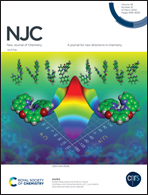Synthesis of glycerol carbonate using Li/Mg/K modified zeolite beta: a kinetic study†
Abstract
In the present investigation, glycerol and dimethyl carbonate were transesterified using a Li/Mg/K modified zeolite beta catalyst to synthesize glycerol carbonate. The various prepared zeolite catalysts were characterized using XRD, FE-SEM, EDS, HR-TEM, XPS, and DLS techniques. Many tests were conducted to optimize the reaction conditions to obtain the highest yield of glycerol carbonate by changing the catalyst concentration (5–20 wt%), glycerol-to-dimethyl carbonate mole ratio (1 : 2–1 : 6), and reaction temperature (65–105 °C). A maximum of 81.48% glycerol carbonate was obtained under optimized reaction conditions (a glycerol : dimethyl carbonate mole ratio of 1 : 5, a Li20β dosage of 10 wt% w.r.t. GLY, a temperature of 95 °C, and a time of 5 h). The experimental data followed second-order reaction kinetics with an activation energy of 34.60 kJ mol−1.



 Please wait while we load your content...
Please wait while we load your content...